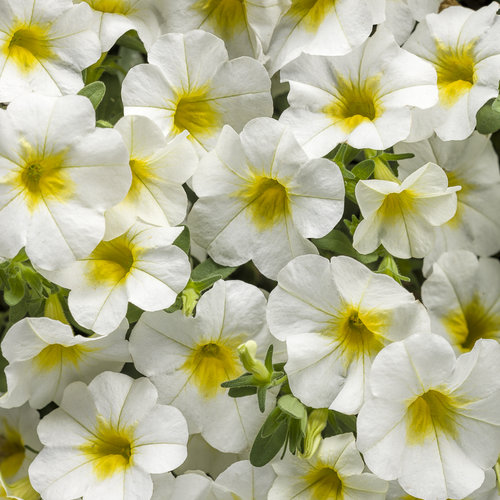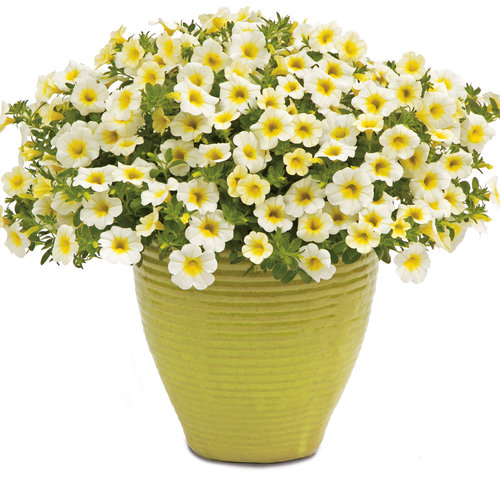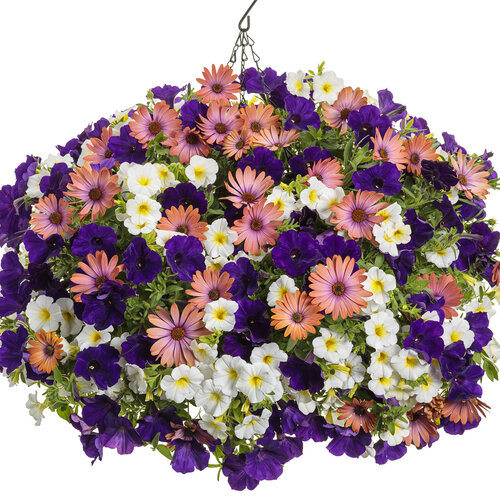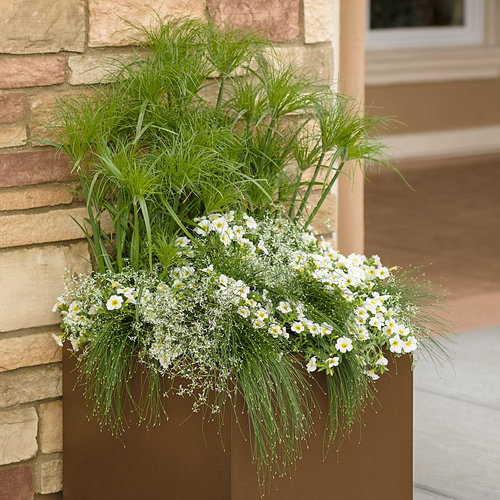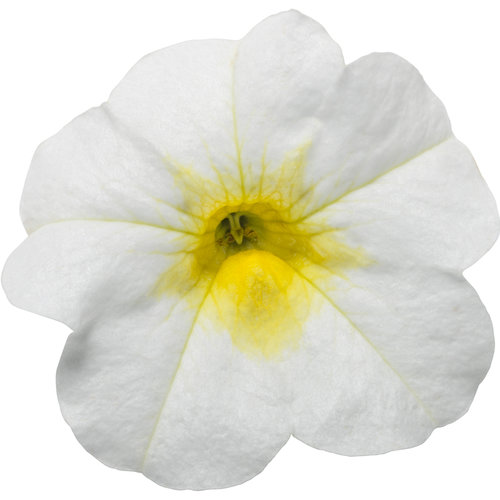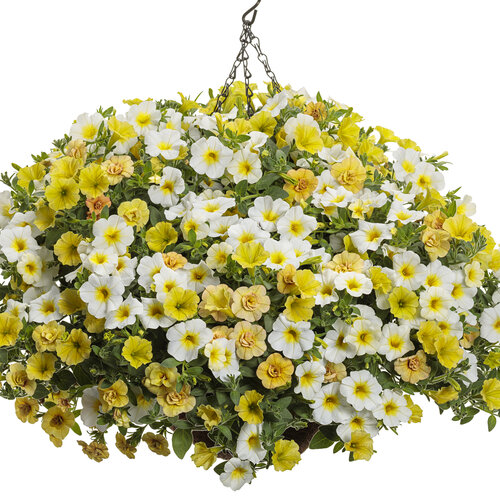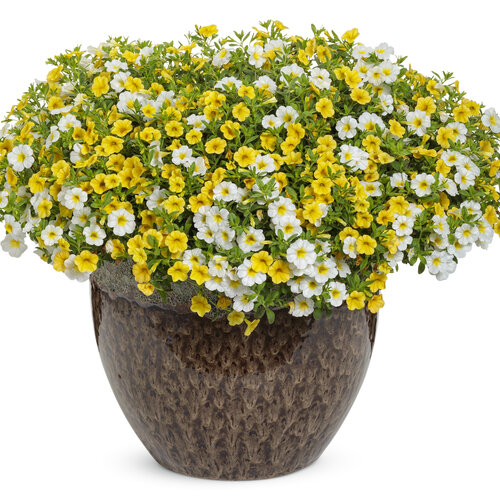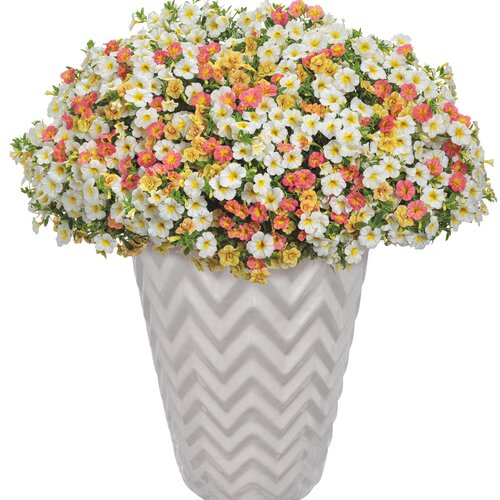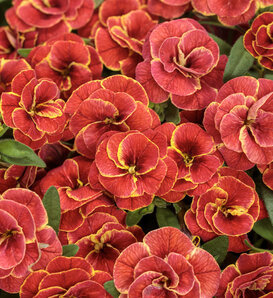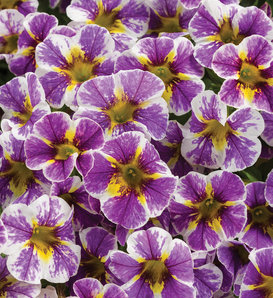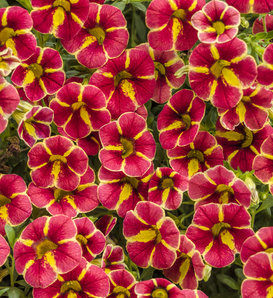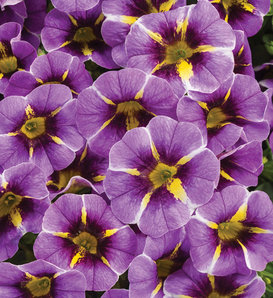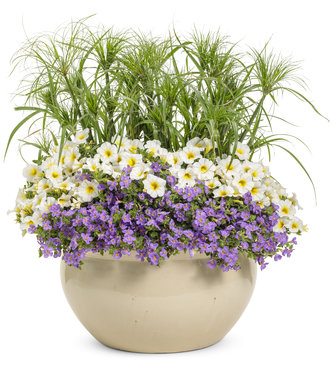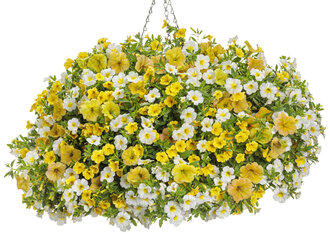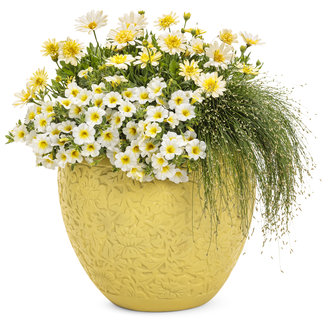These were one of the best performers among the Superbells I planted in my balcony railing planters. They flowered prolifically from the time I planted the young small plants just after the last frost, until I had to yank out the enormous trailing 3 foot long masses they had grown into at the end of November so I could prepare for winter/spring. A good companion variety would be Lemon Slice, which grew at about the same rate and size. I also planted them with Blue Moon Punch and Tangerine Punch, which were slightly less vigorous but still kept up pretty well.
Superbells® Over Easy™ Calibrachoa hybrid
- Part Sun to Sun
- Spring
- Summer
- Fall
-
6 - 12 Inches8 - 12 Inches12 - 24 Inches15cm - 30cm20cm - 30cm30cm - 61cm
Features
Abundant, small petunia-like flowers all season on cascading growth; low maintenance
Continuous Bloom or RebloomerLong BloomingFall InterestHeat TolerantDeadheading Not NecessaryAttracts:HummingbirdsCharacteristics
Plant Type:AnnualHeight Category:ShortGarden Height:6 - 12 Inches 15cm - 30cmTrails Up To:18 Inches 46cmSpacing:8 - 12 Inches 20cm - 30cmSpread:12 - 24 Inches 30cm - 61cmFlower Colors:WhiteFlower Colors:YellowFlower Shade:White with a yellow eyeFoliage Colors:GreenFoliage Shade:GreenHabit:Mounding TrailingContainer Role:SpillerPlant Needs
Light Requirement:Part Sun to SunThe optimum amount of sun or shade each plant needs to thrive: Full Sun (6+ hours), Part Sun (4-6 hours), Full Shade (up to 4 hours).
Maintenance Category:EasyBloom Time:Planting To Hard FrostHardiness Zones:9a, 9b, 10a, 10b, 11a, 11bWater Category:AverageNeeds Good DrainageSoil Fertility Requirement:Average SoilUses:ContainerUses Notes:Calibrachoa do not like to have constantly damp soil. They do well in the ground only with good drainage. For most gardeners, containers are the best use for Calibrachoa.
Maintenance Notes:When planting Calibrachoa I often give the plants a slight trim, using a sharp pair of scissors or pruning shears.
When planting Calibrachoa I often give the plants a slight trim, using a sharp pair of scissors or pruning shears. While not a necessary step, it will increase branching and may help your plants look even fuller.
Calibrachoa are usually easiest to grow in containers. If the roots are kept too wet it can lead to root rot diseases. In containers, allow the top of the soil to dry before watering again. If your plant is wilting even though the soil is still damp you likely have a root rot problem.
Calibrachoa can be fantastic in-ground plants, but only if they are planted in well-drained soil. Raised beds would be a good choice for planting Calibrachoa in the landscape. In the ground they shouldn't need much additional water unless conditions are very dry. Proper watering is key to growing good Calibrachoa.
The plants are low-maintenance with no deadheading needed. They will do best if fertilized on a regular basis. Calibrachoa can be sensitive to both high and low pH. If your plants have been growing for a while and then begin to look a bit tired and not so good there are several things to try. If the foliage is yellow there are two possible causes. If you haven't been fertilizing regularly they could simply be hungry and in need of fertilizer. Feed them using a well-balanced (look for something with an n-p-k ratio near 24-12-17) water soluble fertilizer. If you have been fertilizing regularly with a well-balanced fertilizer and the foliage is still turning yellow, it is probably because the pH range in your soil has gotten a bit high or low. The most common impact of this is that Iron can no longer be taken up by the plant, even if it is available in the soil.
The common form of Iron used in fertilizer is sensitive to pH changes. If you think pH is your problem you can either try to lower (or raise) the pH or you can simply apply Chelated Iron, which is available at a wider pH range and should help your plants turn green again. You may also be able to find Iron in a foliar spray (which means you spray it on the foliage rather than applying it to the soil) which can also help your plant turn nice and green again. Stop by your favorite garden center and they should be able to help you choose a product to use. Or use our Proven Winners Water Soluble fertilizer, which has the chelated iron.
As the season goes on the plants can sometimes just start to look open and not as good. This can happen even if they are being watered and fertilized correctly. Fortunately this is very simple to fix. Grab a sharp pair of scissors or pruning shears and give the plants an all over trim. This will cause them to branch out more and should stimulate new growth and flowering, especially if you fertilize right after trimming them back. Just like your hair looks a lot better after a trim, your plants often will too. You will sacrifice flowers for a few days, but the plants should shortly come back flowering more than ever. I will usually give my Superbells a trim back in late July or early August. Should your plants have a few unruly stems that are longer than everything else or sticking our oddly, you can trim these stems back at any time. Calibrachoa are very forgiving when it comes to trimming.
An application of fertilizer or compost on garden beds and regular fertilization of plants in pots will help ensure the best possible performance.
Superbells® Over Easy™ Calibrachoa hybrid 'KLECA16314' USPP 29,741 -
5343321Browse reviews from people who have grown this plant.
-
Jersey Ray, New Jersey, United States, 4 years ago
-
I purchased 5 of these in May and it is August now. I planted them in just over half a day of sun next to my driveway, a very tough, hot dry spot. They are fantastic. I wish I cold post a picture. I have had calibrachoa die out or just stop flowering before but these keep on going. Beautiful.
Beverly Lambert, Minnesota, United States, 7 years ago -
Love this plant, it has stayed good looking all thru our really hot summer. I will definitely be growing this again, mixes well with anything, especially dark blue, Royal Velvet
Grizzly Growers, British Columbia, Canada, 7 years ago -
Bought one 3 weeks ago and it was about the size of a baseball. Fast forward to June 6 and it has more than doubled in size and has plenty of large blooms about it. Pure white with faded yellow throat looks clean and classy. Strong, sturdy and deep green foliage adds stability and wind resistance. More a trailer/spreader than mounding habit but fills pretty well. Definitely recommend.
Matthew Lamb, Maryland, United States, 7 years ago -
late April: Just a couple of weeks after planting these plants had lots of blooms and now, just over a month in their containers they are loaded with beautiful flowers - I can hardly see the leaves! I was hesitant to buy these; thinking they might not do well in New Mexico. They just might be my favorite purchase from this spring. Update June 20th: Purchased 2 Superbells® Over Easy for spring of 2018 and they are my favorite addition for this year. One is in the front of a 17' terracotta planter with 2 Toucan Dark Orange Canna Lily (now 6 or 7 Canna) across the back, and in the middle are 1 Lady Godiva, 1 Vermillionaire and 1 Sunsatia Blood Orange. Over Easy has been covered in a mass of blooms right through the wind, cold, and now lots of heat (really hot). I keep expecting it to slow down but it hasn't. The other Over Easy is in a 12" terracotta pot with just a Vermillionaire. It has even more blooms than the other! This simple 2 plant combo is so full and gorgeous and is definitely my favorite of the season.
Angele, New Mexico, United States, 7 years ago
16 More Recipes- Deep RiverRecipe
What you'll need:
-
1
-
3
-
2
-
- Crushed PineappleRecipe
What you'll need:
-
2
-
2
-
1
-
- CameoRecipe
What you'll need:
-
1
-
1
-
1
-
-



